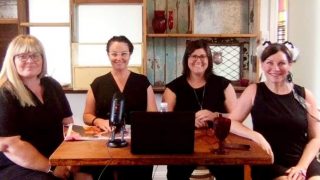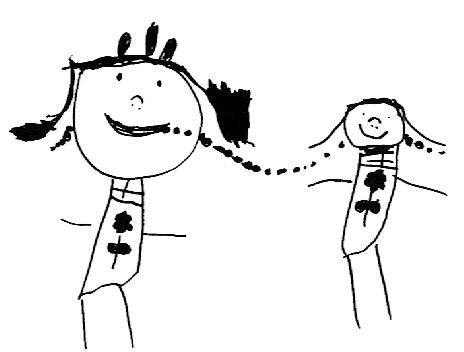
2021 Research Symposium
Landscapes of Relationships: Inspiration, exchange, and dialogue for the future of childhood
Exchange Conference Room
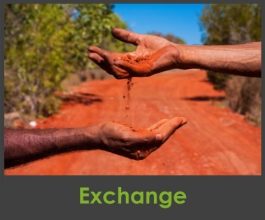
“Learning and teaching should not stand on opposite banks and just watch the river flow by; instead, they should embark together on a journey down the water. Through an active, reciprocal exchange, teaching can strengthen learning and how to learn.” ~ Malaguzzi, L. 1998.
Presentations and Speakers
The Reggio Emilia atelier as an inspiration for pedagogical and cultural transformation: remaking research alliances through exchange, dialogue, and experimentation.
In this presentation, Dr Stefania Giamminuti and Dr Jane Merewether convey insights into the meaning and role of the atelier in the pedagogical and cultural experience of the world-renowned municipal infant-toddler centres and schools of the city of Reggio Emilia in Italy. They outline the atelier’s potential impact on transforming teacher professional learning by sharing a recent research project, a collaboration between academic researchers and a dedicated team of teacher researchers who work with children in a variety of settings from play groups to long day care to government and independent primary school settings. This co-participated research project, the Digital Investigations Atelier, culminated in an installation hosted at Curtin University in Western Australia in July 2019 as part of the REAIE Biennial Conference.
This presentation illuminates: the varied voices of members of the research team discussing the ‘theatrical’ collaborative experience of creating the atelier; the process of installation of this experimental space and its emphasis on alliances, exchange and dialogue between teachers and academics; visitors’ perceptions of their experience interacting in the digital atelier; and the potential of ateliers for bringing experimentation into the realm of the everyday in early childhood settings. We propose that with the aid of experimentation, invention, aesthetics, and professional alliances, early childhood education can be re-made in respect of democratic values and imaginative practices.
Dr Stefania Giamminuti & Dr Jane Merewether
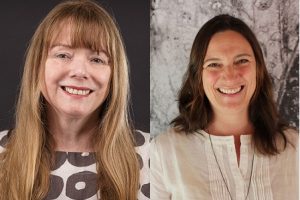
Visions Of Children’s Capability
Just how capable are preschool children and how does the wider community view that capability? Evans Head Preschool facilitates a full day nature classroom ‘Boogal Jugoon’ – on the grounds of a local central school. The learning which occurs throughout the day is infinite, however, the walk to and from the site captured educators’ wonderings in two key ways:
How capable are children? and How is children’s capability viewed in the community?
This presentation presents the happenings that occur as children and educators walk to their nature classroom site. The focus for children’s capability arises from ‘the trolley’, which is laden with the provisions for the day; and the encounters that the group have with the community on the way.
Associate Professor Wendy Boyd, Cath Gillespie and Kirby Barker
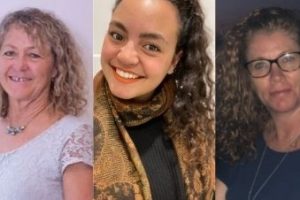
Feeling our way … researching material experiences in a digital landscape
This project was conducted by four colleagues in three states who decided to use the time gifted to them by COVID-19 to research ways of learning together with materials using the internet as a connector and means of communicating.
We all live in a material world in a material body; and yet there is a tendency, often encouraged by our system of education, to retire into the conceptual world within our heads as we grow into adulthood. There are many things however, that we can only learn from the material world. Materials provoke us to see the world anew and in ways that words do not. They are a connector of ways of knowing and generate complex, ecological meaning making.
We set out to conduct a long term research project with an intention of becoming aware of the way materials teach us about the world around us, each other and ourselves. We were interested in the process of sensory perception and the way our senses modify and inform us about the world in which we live. We decided to focus our research on the sensory perception of movement.
From a pedagogical perspective, our intention in working in this way was to become more sensitive to our own learning strategies and the knowledge building strategies of the group. We believed that this way of working, of entering into the unknown, guided by questions and intentions, could help us to form ourselves as teachers and learners. We were not disappointed.
Chris Celada, David Gilkes, Margo Hobba and Shauna McIntyre

In Relationship With Trees
Why do children give trees/ inanimate objects human like qualities and characteristics? Is it to connect with our natural world? To give them an identity in order to form/ pursue a relationship?
This presentation, ‘In Relationship With Trees’ explores the co-construction of a multitude of relationships between, a small group of 3 year olds, the trees both in and around our centre environment and the variety of creative materials offered to them to make sense of their ideas and wonderings. Relationships flourished as their inquiry and natural empathy emerged. The many images, conversations and artworks in this presentation, make evident their deep understanding of the complexities of empathy and humanity. Collaboratively, they embraced our natural environment and its potential to inspire them, exhibiting the significance of working in partnership with each other. Our research encompassed visiting the trees in the park near our service, welcoming a new tree to our environment and exploring trees through multimedia and the 100 languages. This investigation follows their joy and delight in encountering and fostering an ongoing relationship with trees, connectedness in relationship with our natural world and empowering children’s sense of environmental responsibility in knowing that they can make a difference.
“It is our collective and individual responsibility…to preserve and tend to the world in which we all live.”
Antonia Folden

Worlding With Robotics: A Gadigal Song Line
“It matters what matters we use to think other matters with; it matters what stories we tell to tell other stories with; it matters what knots knot knots, what thoughts think thoughts, what descriptions describe descriptions, what ties tie ties. It matters what stories make worlds, what worlds make stories.”
(Haraway, 2016, p. 12)
Country, robots, music, instruments, analogue and digital technologies, children, teachers and curriculum intraentwingled together. Our research pedagogy collective is a syncopated dance of wonder, deliberation, risk, playfulness, faux pas, grappling and bliss that matters. Through a posthuman enquiry we knit and knot together innovative approaches to generating pedagogy that is culturally, politically and creatively nuanced to where we are and who and what else is here with us. The stories we will tell through film making offer a glimpse into the uncapturable moments of our teaching. Festooned with our own learning and our engagements with big ideas in little moments we offer an opportunity to plug into the extraordinary capacities of children and how they utterly surpass the confinements of developmental trajectories. Expect beautiful imagery, playful uses of technology, sounds of Country, musical composition and practical engagements with ‘theory’ as we tell our stories to your stories to make them matter…
Dr Red Ruby Scarlet, Natalie Cordukes, Giuliana Ricci and Catherine Stephenson
